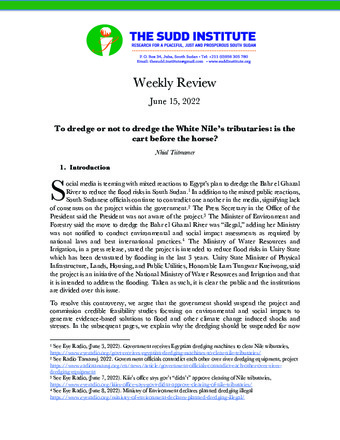To dredge or not to dredge the White Nile’s tributaries: is the cart before the horse?
Publication Summary
Social media is teeming with mixed reactions to Egypt’s plan to dredge the Bahr el Ghazal River to reduce the flood risks in South Sudan. In addition to the mixed public reactions, South Sudanese officials continue to contradict one another in the media, signifying lack of consensus on the project within the government. The Press Secretary in the Office of the President said the President was not aware of the project. The Minister of Environment and Forestry said the move to dredge the Bahr el Ghazal River was “illegal,” adding her Ministry was not notified to conduct environmental and social impact assessments as required by national laws and best international practices. The Ministry of Water Resources and Irrigation, in a press release, stated the project is intended to reduce flood risks in Unity State which has been devastated by flooding in the last 3 years. Unity State Minister of Physical Infrastructure, Lands, Housing, and Public Utilities, Honorable Lam Tungwar Kueiwong, said the project is an initiative of the National Ministry of Water Resources and Irrigation and that it is intended to address the flooding. Taken as such, it is clear the public and the institutions are divided over this issue.
To resolve this controversy, we argue that the government should suspend the project and commission credible feasibility studies focusing on environmental and social impacts to generate evidence-based solutions to flood and other climate change induced shocks and stresses. In the subsequent pages, we explain why the dredging should be suspended for now until credible studies are conducted, subsequently determining the next necessary policy actions in response to the nagging floods in the country, not just Unity alone.
Nhial Tiitmamer has served as the Director of the Environment and Natural Resources Program at The Sudd Institute where he is currently on leave to work with United Nations in South Sudan (UNMISS). He has served as an Adjunct Assistant Professor at the University of Juba where he has taught Environmental Economics, Natural Resources Economics and Environmental Sociology. Between November 2021 and November 2022, Nhial worked as Senior Environment Associate with the United Nations High Commissioner for Refugees (UNHCR) in Juba. Before returning from Canada in 2013, Nhial worked at Arletta Environmental Consulting in Calgary and at University of Alberta’s Augustana Campus in Camrose in Alberta, Canada. Nhial’s research focusses on natural resources governance, environmental protection, climate change, and sustainable energy. He was awarded in May 2023 by the Board of Directors of The Sudd Institute with Research Impact Award for policy impacts. Nhial holds a B.A. in Environmental Studies with a minor in English Literature from the University of Alberta and an M.Sc. in Sustainable Energy Development from the University of Calgary in Alberta, Canada.

